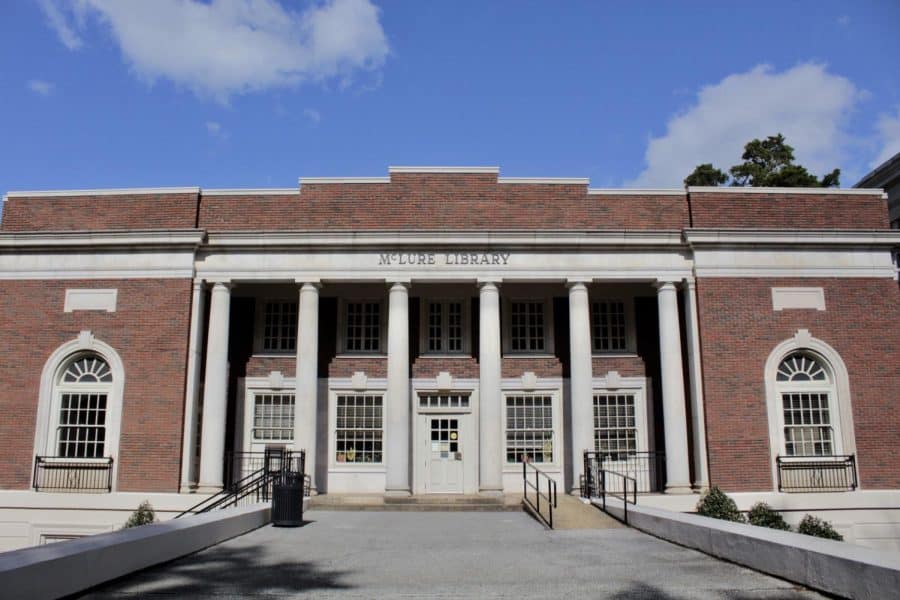Opinion | McLure Library matters
November 9, 2022
In 1939, The University of Alabama finished the construction of its first designated library. Nestled towards the rear of the Quad and aligned with Denny Chimes, Amelia Gayle Gorgas Library is a haven for students.
As you file away from this centrally located library, you’ll find the University’s branch libraries, built later to target more specific subjects.
Rodgers Library for Science and Engineering opened to the public in 1990. Its establishment represented a merger between the Science Library, housed in Lloyd Hall at the time, and the Engineering Library, originally located in Bevill Hall.
Bruno Business Library stands on the previous site of the Phi Kappa Psi House. Since 1994, it has been located on Stadium Drive near Bryant-Denny Stadium. It recently underwent renovations this spring.
The building that became McLure Education Library was built in 1925, at which time it housed a cafeteria for students, a post office and a soda fountain. In 1954, the building was remodeled to become the library that it is today.
McLure is adjacent to Autherine Lucy Hall, one of the College of Education’s main academic and office buildings. Right on University Boulevard, it’s a building that many students likely pass each day without ever knowing what’s inside.
On Sept. 6, a document was uploaded to the Construction Administration’s website, opening bids for renovations and additions to McLure. While renovations are not uncommon on campus, this renovation comes at the price of losing one of our valued resources, the Education Library.
The School of Library and Information Sciences will be rehoused in McLure to provide more space in Gorgas and be closer to its home college, The College of Communication and Information Sciences. The School of Library and Information Sciences has been housed on the seventh floor of Gorgas since its formation as a formal college in 1969.
McLure’s renovations will include addressing American Disabilities Act accessibility and previously ignored maintenance issues that come with a nearly 100-year-old building. Currently, there are no wheelchair accessible routes within the building to any other floor besides the first floor.
Given its proximity to Autherine Lucy Hall, McLure is a hotspot for education majors. The two buildings are still connected by the tunnel that Autherine Lucy Foster took shelter in during her enrollment. Now, it’s utilized by students to go between the buildings for a quick print job or to check out items. While the tunnel will remain, students will now have to find alternatives to McLure’s existing amenities.
Each library offers its own unique features to students within concentrated majors that should not be overlooked or taken away.
The Education Library and curriculum materials are on the base floor of McLure. This is the bread and butter of many hands-on education classes, as it provides children’s books that are often not found in other University libraries and manipulatives to assist in classroom instruction. Without these materials, student teachers can no longer familiarize themselves with emerging media for children or explore various methods to teach certain topics. With about 30,000 materials, containing textbooks, curriculum guides and other educational media, McLure holds a plethora of important literature critical for students in the College of Education.
In addition to offering space for all students, McLure is also home to computers that are accessible to the public. As the only library located on University Boulevard, this brings in an entirely new demographic of patrons who live in Tuscaloosa. Those who are not students can pay a $25 annual fee for a borrower’s card, giving them access to materials within all the libraries.
Not only will UA students be at a loss once these materials are gone, but so will any teachers or student teachers in the area who utilize these benefits.
Libraries on campus are not the only ones experiencing neglect of this nature. The issue extends into the community.
All three branches of the Tuscaloosa Public Library will soon implement new cost-saving measures like reducing hours of operation and spending on books and programming. This includes eight electronic resources that previously came with having a library card, and the summer reading program will be reduced from eight weeks to only four weeks. Library officials say these actions are necessary to combat rising prices given their limited funding from the local government.
McLure is only a symptom of broader library adjustments across the country. Funds are being allocated to different areas on campuses and in local budgets. Hiring freezes are commonplace. But $18 million is about to be thrown into the structure of this building alone.
As a school, we’ll survive with just our remaining libraries, but the resources and experiences lost to the rebranding of McLure will not reveal themselves until it is too late.





















